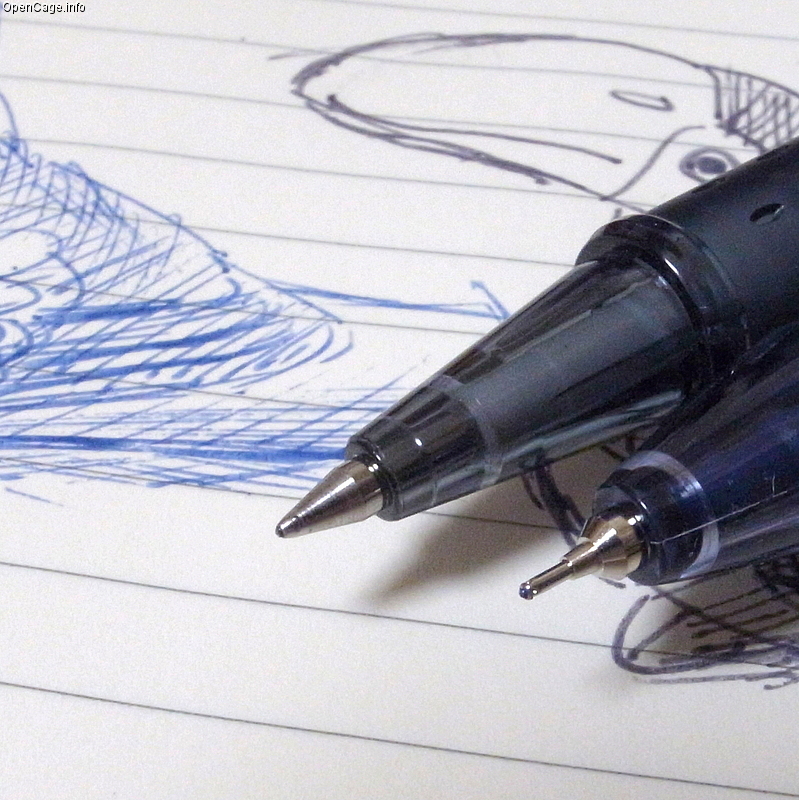by Frannie M.
There is a reason we write. There are many reasons. We write to persuade, to entertain, to move, to communicate, and to deceive. When we pick up a pen we have an intention, fully formed or not. There is no writing without voice, without intent, or purpose. Because voice is, I posit, an essential element of any writing class, I believe it can be a lens through which we view any theory of writing.
This is not to say that I am taking the side of content in the age-old debate of content versus form. Voice is something separate; it is made up of content and form, syntax, personal experience, the state of our personal realities, communities and planets. To discount any one factor is foolish because they all influence our intention and the final result of our writing.
If voice is made up of all of these things, what is it really? Voice is how you choose to make your point. It’s whom you are and what you want to say. You can’t make a decision about what parts of yourself to pour into a composition if you don’t consider the form of that composition and what you’re trying to accomplish. You also can’t make a decision about how to go about composing if you don’t know what the content of that composition will be. There are honest voices, masculine voices, black voices, female voices, evil voices, commanding voices, tentative voices, queer voices, straight voices, persuasive voices, entertaining voices, humorous voices and professional voices. There are combinations of any of those.
To argue the importance of voice in the classroom, I suppose that I must first define what it is I mean by voice. Voice is who you are at the moment you are trying to accomplish something through your writing. Different voices will employ different elements of style—a terse voice, for example, will use short sentences, while an enamored voice might use more florid phrasing. Therefore, voice changes. This is something that happens even when you aren’t writing. For example, the way you communicate and the parts of yourself that you reveal are different when approaching a boss than when you approach your mother.
There is also a place for whatever voice you may use when judgment’s not a concern, and this idea is discussed by Peter Elbow in “Voice in Writing Again: Embracing Contraries:
Much or most writing used to be addressed to a judging authority who knew more about writing or the topic than the writer did. What a huge change the Internet has brought to the experience of writing: so many more writers; so much more writing in the world; so much writing for strangers! Instead of writers only wondering about what teachers will find right and wrong in their words, more and more writers wonder less defensively what kind of person readers will think they are (171).
This means that in the past, voice has had to be adapted to suit the reader/judge of the piece being written. Now, there is an opportunity to consider one’s own personal intentions and experiences in forming their voice. However, I must still maintain that voice is “formed.”
One way to think about this idea is by considering the phenomenon of “extremist diversity writing,” a movement which considers “natural language” to be the only true voice of a writer or student of writing. In “Diversity Writing: Natural Languages, Authentic Voices” by Phillip P. Marzluf, the author discusses the dangers of emphasizing what may be false voices in an effort to make writing more “honest and natural.” This article illustrates the fact that voices are fluid things and that sometimes, particular choices made with regards to voice can be just plain wrong. One example that Marzluf uses in his essay is the poet bell hooks. hooks felt marginalized by the overemphasis on her ethnic identity by professors of writing. Often, her professors and other students would say that she sounded better when writing in a more colloquial fashion (516). If voice is about expressing your true intention or self to the world in the way most fitting, isn’t this counterproductive? Anyone who feels that they are sounding dishonest (when it’s not their specific intention to sound so) isn’t utilizing the right voice for the piece they are working on.
Everyone’s Theory of Writing is Right, Just Not By Itself
In “Being a Writer vs. Being an Academic: A Conflict in Goals” Peter Elbow states that there is an inherent conflict between the two roles. The first argument I must make is that the reason for this conflict lies in voice and intention; however, I don’t actually believe that a true conflict exists. Being a writer and being an academic are different roles, and therefore one would use different modes of discourse dependent on that role. You wouldn’t say that being a doctor and being a lawyer are conflicting professions: they are simply different professions. An academic has a particular aim in writing, as does a creative writer. Elbow clearly defines a writer as a creative writer, and talks about the difficulties in writing and knowing, and the tenet academics hold dear that if one can’t write it one doesn’t know it:
Writers testify all the time to the experience of knowing more than they can say, of knowing things that they haven’t yet been able to get into words. Paying attention to such intuitions and feelings often leads them to articulations they couldn’t otherwise find. Readers (and teachers and academics), on the other hand, being on the receiving end of texts, are more tempted to say, “If you can’t say it, you don’t know it”-and to celebrate the doctrine that all knowledge is linguistic.
I’d like to point out to academics that believe this is a hard and fast rule that sometimes the reverse is true: one could write it, but not know it at all. Let us take the example of someone who functioned most as a writer and occasionally put on his Academic-Hat. George Orwell, almost immediately before penning 1984, wrote an essay called “Politics and the English Language.” In it, Orwell discusses the decline of language through an academic’s lens. He brings up a point relevant to this discussion, that:
Our civilization is decadent and our language — so the argument runs — must inevitably share in the general collapse. It follows that any struggle against the abuse of language is a sentimental archaism, like preferring candles to electric light or hansom cabs to aeroplanes. Underneath this lies the half-conscious belief that language is a natural growth and not an instrument which we shape for our own purposes.
So! Orwell too has felt the powerful influence of this idea to which Elbow alludes about language’s control over itself and its abilities, once confronted with the rise or decline of society. However, even while taking on an academic role and deriding the use of “Operators or verbal false limbs,” Orwell slips into the modes of language to which he objects throughout the essay:
Simple conjunctions and prepositions are replaced by such phrases as with respect to, having regard to, the fact that, by dint of, in view of, in the interests of, on the hypothesis that; and the ends of sentences are saved by anticlimax by such resounding commonplaces as greatly to be desired, cannot be left out of account, a development to be expected in the near future, deserving of serious consideration, brought to a satisfactory conclusion, and so on and so forth.
“…and so one and so forth.” Really? For the sake of keeping language alive and not inserting premade phrases when a simple and appropriate word would work, wouldn’t you want to just say, “etcetera?”
He wouldn’t. There’s no reason one can’t mix and match. Being honest often means being contradictory. You can be meta-analytical the same way you might be meta-fictional or meta-poetic. This is exactly what Peter Elbow is doing by writing this piece in the first place. Despite the contradiction, Orwell uses a phrase similar to those that he accuses of killing the English language, for the sake of style and his unique voice—the perspective of one that writes but also thinks about the process deeply.
And so, how can the different schools of thought as far as writing ideology be brought together in terms of voice? As we all tried to visually depict each school of thought on that second week of class, I could see why they all existed. Are you writing a scientific paper? You should consider scientific styles of writing. For a novel serving as both, perhaps, entertainment and social commentary, or for a non-fiction work set against the backdrop of a political/social/historical landscape? Socio-cultural approaches to writing may apply. Writing for self-expression, therapy, entertainment, or narrative purposes? Go ahead and write from your bubble, but remember that it’s your intention, it’s what you want to express in the way you want to express it, and I don’t want to see you pointing fingers at the guy surrounded by newspapers, or at the other one clutching The Elements of Style and a bunch of psychology journals to his chest.
Content And Form
I’m sorry to tell you, Stanley Fish, but it’s not about the form, or the content. It is about the intention for the piece, the purpose behind it, which should guide a writer to making the best choices she can, based on what she wants to accomplish. Stanley Fish may argue that passive sentences have no place in the freshman writing class, though they are often used for lyrical purposes, because “Content is a lure and a delusion, and it should be banished from the classroom. Form is the way” (1). When trying to find a suitable example of a counterargument to Fish, I look to e. e. cummings’s poem, “since feeling is first.” This poem shows that both content and form are totally necessary—the disjointed line breaks and twists of phrase are purposeful, grammatically incorrect, intentional choices made by the poet to prove his point. I think that the best prose incorporates some of the most important elements of poetry. Voice in poetry is all about making choices, and prose should, ideally, operate in a similar fashion.
 But Fish does have a point. There would be no use for grammar classes if modes of discourse didn’t require you to make use of certain basic rules of construct. In prose there are parts of a sentence, each of which must be present for a statement to be clear; there are particular times when one must capitalize or indent; there are run-ons, there are fragments, there are passive sentences and there is always someone ready to edit all the life out of a piece of writing for the sake of proper syntax.
But Fish does have a point. There would be no use for grammar classes if modes of discourse didn’t require you to make use of certain basic rules of construct. In prose there are parts of a sentence, each of which must be present for a statement to be clear; there are particular times when one must capitalize or indent; there are run-ons, there are fragments, there are passive sentences and there is always someone ready to edit all the life out of a piece of writing for the sake of proper syntax.
Poetry, (and I firmly believe, good prose) takes the best features from verbal and written communication and combines them to make something more lasting and important. Everything unnecessary can be removed; if a poet chooses to do so, they can make their work completely tight and concise. Every word, in a good poem, is carefully chosen for a good reason; and in those good poems in which each word is not carefully chosen there is usually a good reason for that, too. The amount of editing that a person chooses to do to their work should match the idea or emotion they are trying to convey—you can’t ask Diane DiPrima if she carefully considered each and every word in her rants. Whether she did or she didn’t, the style in which she wrote is justified by her subject matter. Her form is justified by her content. And if this isn’t something Stanley Fish conveys to his writing students, he is doing them a disservice and making them less efficient, less interesting, and less understanding of what it means to truly write.
So If Voice Should Be a Focus, Shouldn’t We Be Able to Teach It?
There are a ton of theorists out there who seem to think that if they simply spout their beliefs, we lowly teachers will be able to easily, magically translate the ethereal, academic, progressive practices into those that mesh with the real life classrooms in which we are to function. This makes me angry. When teachers are forced to consider daily the multitude of requirements and limited resources (especially that most precious one: time), a little nudge in the right direction, and dare I say it, a “how-to,” might be useful. In “Teaching Voice” Margaret K. Woodworth attempts to do just that.
In every educational methods course I’ve taken, there has been an emphasis on the importance of modeling. In her piece, Woodworth breaks down exactly how she models voice to her writing students, and it’s absolutely fantastic. She shows the students her own incarnations of a writing piece and the changes in approach, word choice, detail, and form that she uses to write about an experience from her childhood (152-154). Her students are then successfully able to attempt the same thing, writing about something that happened in multiple ways. This also relates to the idea that wide readers become the best writers. By reading voraciously and noting the differences between authors, students can, in effect, achieve similar results. Writers who are willing to give time and attention to the elements that make up voice are going to be successful in altering their writing in order to affect the voice present within it.
Despite the seeming ease that an experienced teacher of writing such as Woodworth my have, however, the “paradigm shift” discussed by experts in writing theory has, according to Elizabeth D. Rankin in “Revitalizing Style: Toward a New Theory and Pedagogy,” has taken style out of the equation of what’s important to be taught in the classroom (8). Without style, voice is a difficult thing to accomplish. In choosing our technical ways of writing, as in short sentences versus long, elevated language versus colloquialisms, we are showing the sides of ourselves making whatever argument is forming on the page. Without teaching style, we cannot effectively teach voice, and therefore the point that proponents of voice and style such as myself are trying to make is moot.
Rankin asserts that there are two reasons for this unfortunate decline in the teaching of style and the importance it is granted. One is the problem of competing concerns. Certain ideas become faddish and others go out the window in the writing world. The other is that no one has offered a complete theory of style in the world of New Rhetoric (8). Rankin makes an excellent point, however, that the New Romantics have given voice and style a bad name in their desperate plea for constant subjectivity (9). If this is the case, and students of writing are being led to believe that subjectivity is the only way to go, rather than considering the content when choosing a mode of discourse, it truly is a difficult problem to solve. She discusses Louis Milic, who believes that “the theories are reconcilable.” Why? Because one can consider more than one mode of discourse, and multiple pedagogical methods in order to best serve students of writing—“’despite the fact that they seem incompatible.’”
Why, I ask again, must one choose sides? It is as if people who think about writing are caught up in some sort of westward expansion; it is like they must all stake their claim to their land and what is right or wrong. In contrast, I advocate a more Native American approach to teaching writing: Tell students that they should take only what they need, use only the land necessary for their survival, and migrate to better pastures when the necessity arises.
The Paper is Written: Now What?
Taking a page out of Woodworth’s book, it’s time for a bit of how to. With her help I have already made it clear that modeling voice is essential for students to understand the key elements of voice and its importance, but what does one do once the story/essay/paper/poem is finished? How can one evaluate student writing in a way that promotes the appropriate use of voice and effective use of language?
There are many ways to be an effective grader for students when evaluating pieces of writing. However, the method that, for my purposes, makes the most sense when considering student voices is conferencing. Conferencing allows a teacher to understand the intention of the student perhaps more clearly than they might if they were to simply read an essay and take what the student wrote at face value. Don’t forget: we’re talking about students, individuals who most likely still lack the necessary mastery of writing and language to most effectively convey their intentions.
In “The Listening Eye: Reflections on the Writing Conference,”  Donald M. Murray discusses the importance he places on conferencing with students and the impact it has made on his teaching and their learning over the course of the career. The beauty of his technique is in its simplicity: give students agency, and they will teach themselves most of what they don’t want to have to hear from you. It’s only Murray’s last question of his conferences that asks, “What questions do you have of me?” (15). In this way, Murray is ensuring that he meets the students’ needs and that any directives on his part don’t mask their intentions.
Donald M. Murray discusses the importance he places on conferencing with students and the impact it has made on his teaching and their learning over the course of the career. The beauty of his technique is in its simplicity: give students agency, and they will teach themselves most of what they don’t want to have to hear from you. It’s only Murray’s last question of his conferences that asks, “What questions do you have of me?” (15). In this way, Murray is ensuring that he meets the students’ needs and that any directives on his part don’t mask their intentions.
Voice isn’t the Only Thing; Voice is a Pretty Important Thing
It is important to remember that, obviously, voice is not always the most important lesson in the writing classroom. But, because voice takes into account style, language choices, feeling, syntax, personal experience, world events, community perspectives, writers’ agency, and more, it is an important idea to incorporate into the classroom.
Through modeling, encouraging reading, talking about choices, experiences, perspectives and language, voice can absolutely be taught in a writing classroom. Are all students equally capable of perfecting the search for the most effective voice per piece of writing? Probably not. Can they all be made to understand the importance of making that a goal in their writing? Absolutely. No piece of writing can achieve its aim if it’s written in a voice that counters its intent. No piece of writing is effective if content or form is left out of the equation. Let’s stop insisting that elements of writing must be at odds to each other or ranked above one another and begin trying to teach our students that writing should be a unifying art. Let’s teach them that every word has a purpose as does every phrase. And let them learn that those purposes should align with their own.
Tags: Intent, Pedagogy, Teaching, Voice, Writing






